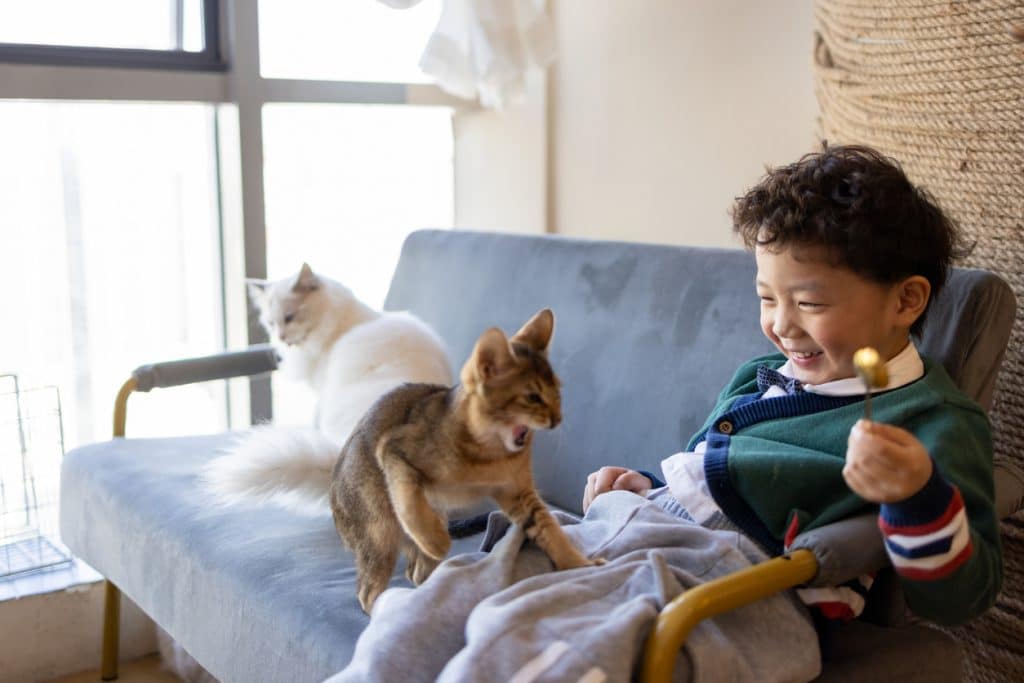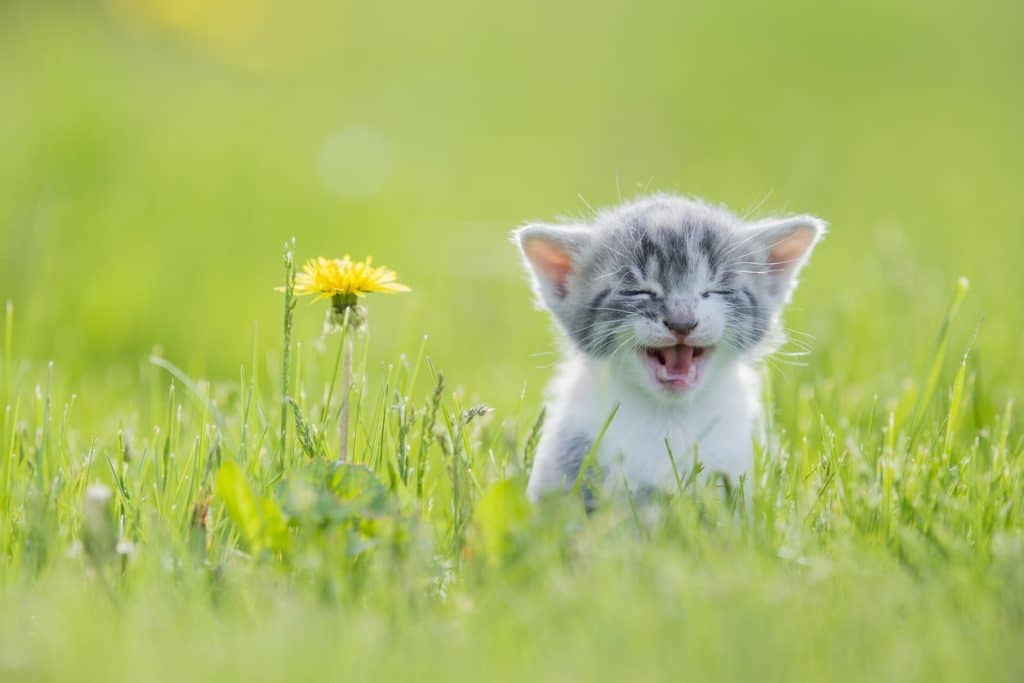It may be disappointing to learn, but your cat cannot laugh, and it’s unlikely they’ll see the funny side of your best jokes, either. Laughter is a form of play vocalization, which is a fancy way of saying noises made during play time. But just because your cat doesn’t laugh in the strictest sense doesn’t mean they can’t show you their happiness in other ways. Similarly, cats make all kinds of funny noises, from purrs and chirps to growls and yerps, and it can be hard to know what these mean; sometimes these could be easily mistaken for laughter. These thoughts are just too funny not to delve into.
What Is Laughter? And Which Species Can Laugh Anyway?
Laughing is something wonderful and it’s not just people who do it. A 2021 study found that 65 other species laugh as well! According to the study, published in the journal Bioacoustics, researchers at UCLA found that most primates laugh, bottlenose dolphins laugh, and even mice laugh (just ultrasonically). As summed up by the journal LiveScience, “many animals produce sounds during play that are unique to that pleasant social interaction; researchers consider such vocalizations to be a close analogue of human laughter.”
It’s important to note that these researchers defined laughter as “play vocalizations” to ensure that species which can’t laugh just like humans do–but still express joy through similar vocalizations–were recognized. Domestic cats were included in this study and though it found that cats do not exhibit play vocalizations, anyone who lives with cats knows some do indeed have vocalizations that express happiness.
Why Can’t Cats Laugh?
While a cat isn’t physically wired to fall over due to a long, uncontrollable, deep belly laugh, it doesn’t mean that they aren’t capable of expressing, or recognizing, similar feelings. Purring, the “slow blink“, trilling, and even how your cat’s tail is moving can all be indicators of happiness in a cat’s language.
Signs your cat is happy, healthy and having a good time
- Body language: If your cat is healthy and happy, you’ll know so from their relaxed body language.
- Activity level: If your cat sleeps a lot but has regular bursts of activity, this is normal and fantastic. And probably funny, too.
- Good appetite: A cat with a healthy appetite is generally a happy cat.
Tips to increase the bond you share with your cat
Primary to a cat’s happiness is a solid bond with their people as well as other animals who might share their home.Some great ways to bond with your cat include:
- Focused playtime: Just a few minutes a day of focused playtime with your cat reinforces your bond and is great for their physical health as well.
- Grooming: Brushing, combing, and even massage, are great ways to let your cat know you care–and are great ways to check for pests such as fleas or potential injuries your cat might have.
- Treats: Giving your kitty treats is just a nice thing to do!
- Cuddle time: Snuggles or lap time with your cat can make them happy, but are also good for your health too.
Does Your Cat Know You’re Laughing At Them?

Cats are definitely funny but there’s really no scientific proof as to their capacity to have a sense of humor like humans do. Because of this, it makes sense that your cat wouldn’t react to being laughed at. What they might react to is the fact that you are paying attention to them. While in general this is a positive thing, some cats might react to loud noises or, say, pointing a finger in their face while laughing, as a threat. In these cases a cat might react with a fear response–hiding or hissing to express their displeasure at the noise or action. If so, you might just adjust your behavior so that it isn’t something your kitty might be threatened or scared by.
My cat hisses at me when I laugh
- If your cat is hissing at you when you laugh it probably means there is something about your behavior that feels threatening. This could mean you need to adjust the volume of your laugh or be conscious of the body movements you make when laughing. Or, simply, that your cat doesn’t like your laugh. Cats are picky, you know.
My cat hides when I laugh
- Similar to the above situation, if a bout of giggles drives your cat to disappear it’s probably because there is something about the noise or actions associated with your laugh that make her uncomfortable. Simply be aware of your laugh, its loudness, and your actions and you’ll likely be able to figure out the offense.
My cat does nothing when I laugh
- If your cat doesn’t respond at all to your laughter, that’s probably ideal. This means your cat is comfortable and secure with you, no matter how noisy and strange you might sometimes appear to them.
Convinced Your Cat “Laughed”? 4 Noises Easily Mistaken For Laughing
As we’ve established, cats make all kinds of funny noises but this doesn’t mean they are always having fun. If your cat suddenly begins to make laughing-type noises you “should talk to your veterinarian as soon as possible because the cat might be coughing or having difficulty breathing,” notes Dr. Mikel Delgado, a Certified Applied Animal Behaviorist and Certified Cat Behavior Consultant who has been working with cats for over 20 years. Some of the typical laughter-type sounds you might hear from your cat include:
- Coughing: As Dr. Delgado notes above, coughing can sound funny but it can also mean there is an issue. Cats can cough if they’ve got something stuck in their throats or if they are suffering from an upper respiratory infection. No matter the cause, if your cat suddenly starts coughing, it’s a good idea to get them checked out.
- Retching: Sometimes also called “horking” by cat people, retching means your cat is trying to get something out. Usually this is a hairball, which is a completely normal thing for a cat to hork up. If your kitty is retching and nothing is coming up, or is actually vomiting, these are signs something could be wrong. Many times, this could be the result of an upset tummy but could also be a sign of other underlying issues such as irritable bowel disorder. Again, great idea to have your vet check it out.
- The “man man” noise: This is hard to explain, but the “man man” noise, which sounds something like this (with many variations), is generally considered an expression of pleasure and can sound a lot like laughing. Usually this just means your cat is enjoying whatever is happening, from petting to eating, and you get the joy of getting a laugh out of it yourself.
- Chirping: That sound your cat makes when it sees a bird or squirrel outside your window generally signifies excitement. All cats are different so sometimes this can sound less like a chirp and more like a laugh (and looks like one too!)
Just because cats can’t physically laugh like we do doesn’t mean they don’t experience the same kind of joy. If your cat is being funny and it elicits a positive response from you, that’s probably exactly the point of the behavior. So encourage it–being silly and having fun is good for us all.

